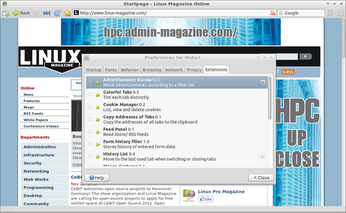Midori: Low-fat Browser

Productivity Sauce
My recent weekend project involved putting my trusty ASUS Eee PC 900 back in service as my couch and kitchen machine. Despite its modest specs, this little netbook is still capable of performing daily computing tasks with aplomb. But to make Eee PC 900 a decent machine for accessing the web, I had to replace the Chromium browser bundled with the latest version of Lubuntu. After trying several lightweight alternatives, I settled for Midori. Although Midori may not include the advanced features of mainstream browsers, all the essential functionality is there. This includes tabs and a speed dial feature which lets you add shortcuts to often-used Web sites.
Unlike Chromium, Midori sports a separate search bar, but you can also use the main address bar to perform searches. The browser supports several popular search engines, and you can easily add your own. Midori supports extensions, and even though the supplied collection of extensions is pretty limited, it includes a couple of must-have tools like an ad blocker, a feed reader, and a user add-ons extension. The browser also provides support for private browsing, and you can easily change the user agent, so the Web sites and services can identify the browser as Firefox, Safari, or even Internet Explorer. Last but not least, Midori is lightning fast, which makes it a perfect choice for older machines.
comments powered by DisqusSubscribe to our Linux Newsletters
Find Linux and Open Source Jobs
Subscribe to our ADMIN Newsletters
Support Our Work
Linux Magazine content is made possible with support from readers like you. Please consider contributing when you’ve found an article to be beneficial.

News
-
Mozilla Plans to AI-ify Firefox
With a new CEO in control, Mozilla is doubling down on a strategy of trust, all the while leaning into AI.
-
Gnome Says No to AI-Generated Extensions
If you're a developer wanting to create a new Gnome extension, you'd best set aside that AI code generator, because the extension team will have none of that.
-
Parrot OS Switches to KDE Plasma Desktop
Yet another distro is making the move to the KDE Plasma desktop.
-
TUXEDO Announces Gemini 17
TUXEDO Computers has released the fourth generation of its Gemini laptop with plenty of updates.
-
Two New Distros Adopt Enlightenment
MX Moksha and AV Linux 25 join ranks with Bodhi Linux and embrace the Enlightenment desktop.
-
Solus Linux 4.8 Removes Python 2
Solus Linux 4.8 has been released with the latest Linux kernel, updated desktops, and a key removal.
-
Zorin OS 18 Hits over a Million Downloads
If you doubt Linux isn't gaining popularity, you only have to look at Zorin OS's download numbers.
-
TUXEDO Computers Scraps Snapdragon X1E-Based Laptop
Due to issues with a Snapdragon CPU, TUXEDO Computers has cancelled its plans to release a laptop based on this elite hardware.
-
Debian Unleashes Debian Libre Live
Debian Libre Live keeps your machine free of proprietary software.
-
Valve Announces Pending Release of Steam Machine
Shout it to the heavens: Steam Machine, powered by Linux, is set to arrive in 2026.

